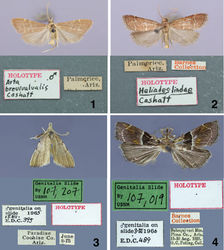Difference between revisions of "Penthesilea sacculalis baboquivariensis"
m (Imported from ZooKeys) |
m (1 revision) |
(No difference)
| |
Latest revision as of 13:53, 22 October 2013
| Notice: | This page is derived from the original publication listed below, whose author(s) should always be credited. Further contributors may edit and improve the content of this page and, consequently, need to be credited as well (see page history). Any assessment of factual correctness requires a careful review of the original article as well as of subsequent contributions.
If you are uncertain whether your planned contribution is correct or not, we suggest that you use the associated discussion page instead of editing the page directly. This page should be cited as follows (rationale):
Citation formats to copy and paste
BibTeX: @article{Solis2013ZooKeys344, RIS/ Endnote: TY - JOUR Wikipedia/ Citizendium: <ref name="Solis2013ZooKeys344">{{Citation See also the citation download page at the journal. |
Ordo: Lepidoptera
Familia: Pyralidae
Genus: Penthesilea
Name
Penthesilea sacculalis Cashatt subsp. n. – Wikispecies link – Pensoft Profile
Description
Alar expanse. 13 to 17 mm.
Head. Labial palpus dark pinkish-brown; frons, vertex, occiput, and antenna pinkish-brown.
Thorax. Upper and lower surfaces pinkish-brown. Forewing same as the nominate species except pinkish-brown. Hind wing pinkish-brown occasionally with a small white spot as in Penthesilea sacculalis, but with no dark scaling anteriad or posteriad. Legs dark pinkish-brown with mid and hind tarsi white.
Abdomen. Pinkish-brown with terminal scale tufts pinkish-brown.
Genitalia. As described for the genus.
Type data
The holotype, allotype, and forty-four paratypes are from the Baboquivari Mts., Pima Co., Arizona. The male holotype and female allotype are in the USNM. The male holotype is from Baboquivari Mts., Pima Co., Arizona, August 15-30, 1923, O. C. Poling, is labeled as the holotype, and the female allotype is labeled, August, 1924, O. C. Poling. The paratypes are labeled as follows: UNITED STATES: ARIZONA: two males and two females, elevation approximately 5000 ft., June 15-30, 1923 (USNM); one female, July 1–15, 1924, O. C. Poling (USNM); one female, July 15–30, 1924, O. C. Poling (USNM); two females, Aug. 1–15, 1924, O. C. Poling (USNM); one male and four females, Aug. 15–30, 1923, O. C. Poling (USNM); one male Aug., (USNM); three males and ten females, Sept. 1-15, 1923, 1924; O. C. Poling (USNM); one male and one female, Sept. 15–30, 1924, O. C. Poling (USNM); one male and four females, Oct. 1–15, 1923, O. C. Poling (USNM); one male and one female, Oct. 15–30, 1924, O. C. Poling (USNM); three males and two females, Sabino Canyon, Sept. 5-6, 1951, L. M. Martin (CNC); one male and one female, Sabino Canyon, Sept. 5, 1951, R. J. Ford (CNC).
Life history
Unknown.
Remarks
This subspecies differs from the nominal species only by the pinkish-brown coloration.
Taxon Treatment
- Solis, M; Cashatt, E; Scholtens, B; 2013: New North American Chrysauginae (Pyralidae) described by E.D. Cashatt ZooKeys, 344: 55-71. doi
Images
|

![Figures 11–16. Male, female genitalia. 11 Paragalasa exospinalis holotype male, USA, Arizona, Cochise Co., Paradise, June 8-15 [no year given], EDC 395, USNM 107207 12 phallus, data same as previous 13 paratype female, USA, Arizona, Redington, [no collection date on label], EDC 398, USNM 107089 14 Penthesilea sacculalis baboquivariensis holotype male, USA, Arizona, Pima Co., Baboquivari Mts., 15–30 Aug 1923, O.C. Poling, Coll., Barnes Collection, EDC 489, USNM 107019 15 phallus, data same as previous 16 allotype female, USA, Arizona, Pima Co., Baboquivari Mts., [days crossed out] Aug 1924, O.C. Poling, Coll., Barnes Collection, EDC 138, USNM 100018.](https://species-id.net/o/thumb.php?f=ZooKeys-344-055-g003.jpg&width=171)